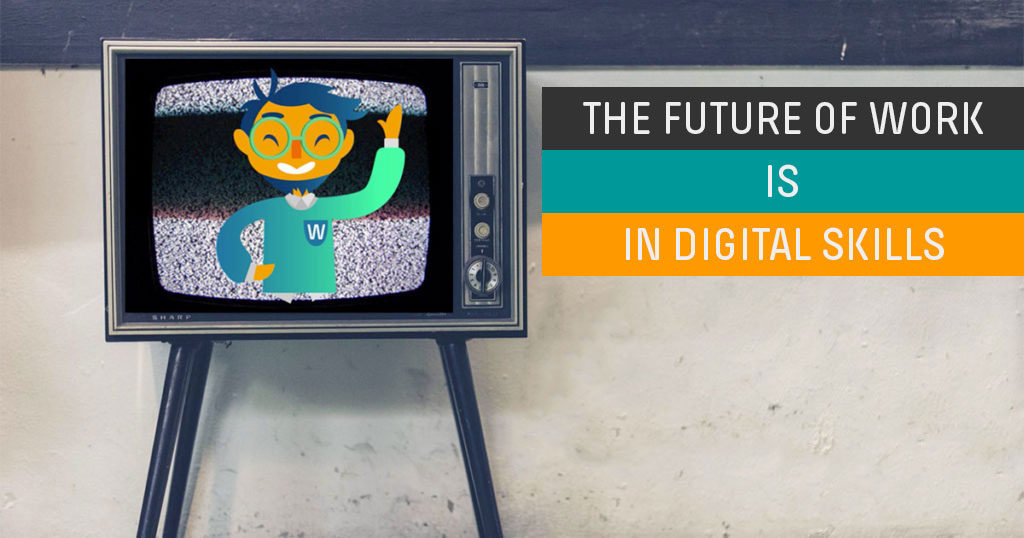No products in the cart.
English
The future of work is in digital skills
In this blog I would like to explain a bit what role digital skills play and how they can be acquired and maintained.
Digitalization applies to all of us
The future work cannot be described with certainty, except for one thing: it will require digital skills. Every one of us sooner than later must be sufficiently capable of using information technology, whether we like it or not.
We already do a lot of things digitally. For example, every day our working hours are recorded and sent through digital invoices, or we constantly use various digital communication methods. Especially in office work, digitalization is everywhere: we calculate, present data and communicate more digitally than in any other way.
Expertise is a risk
The lack of basic digital skills means, in practice, that a person is unable to be competitive in today’s work and their ability to carry out any jobs becomes weaker day by day.
I give you a practical example: if I throw a hat today, 50% of the work requires digital skills. In ten years, the same activity will require 50% + X digital skills, and X will hardly be a small figure.
Inexperience is also expensive: In the Netherlands they have calculated that the lack of digital skills costs almost EUR 20 billion a year. Another study in Greece showed that poor skills in using spreadsheets can cost over € 500 per employee per year, and for those working with databases the cost is over € 1,000 per employee.
Digital skills are not created from scratch
The generation of people born in the 21st century, also called “digital”, is often automatically perceived as able to understand digital issues, but the reality is not that simple.
Young people who have grown up to with Internet have a skill set that is difficult to apply in working life, even though they know how to use different online services. In many cases young workers have the same learning needs as their parents, for example, when it comes to building and formatting documents, presentations or tables, computing or even promoting contents online.
What youngsters normally have, compared to their parents, is a higher starting point to improve their digital skills.
In addition, digital skills constantly need to be updated. Applications change, or they are completely replaced with new ones, and totally new work patterns are created. Upgraded knowledge is at least as important as basic knowledge: that is why maintaining and improving our own skills is perhaps the most important part of the digitalization.
Learning and updating digital skills requires work and patience. The best method for learning basic and advanced skills is a training led by a trainer, in a classroom or in distance, because the shortcomings are immediately noticed and corrected.
Online learning supports learning that has already begun
An important part of learning is to maintain and upgrade the required skills using the best suitable method.
Online learning at its best supports a learning process that has already begun. The point here is to be self-driven: the more a person learns from a trainer, the better results come from of online learning.
E-learning is also well suited for repeating, for example, a classroom learning. When a specific content is once taught, it cannot stay in our memory indefinitely without being strengthened. This is where e-learning is needed, and good learning outcomes are achieved through classroom trainings and e-learning as their support.
When we have good digital skills, e-learning is a particularly good environment: when studying on a digital platform, the learning experience is a better way to learn. Online learning is a great way to learn digital skills.
Study material should be interesting
My own attitude towards e-learning is the following: learning material should be interesting, even exciting. The most concrete way to achieve this is by using videos, because studying by reading the material only works with a few learning strategies.
The content explained through a video with a good and engaging method is clear and illustrative, because the process can be viewed in its entirety step by step, and it is not treated only in theory. And if there is a theory, such as learning material, it can usually be visualized sensibly. And with the help of practical exercises and assessment tests, the whole learning process is fully involved.
You learn new things every day in Wistec Online
Based on these considerations, we have developed an online learning environment called Wistec Online. Our aim is to offer a service that supports lifelong learning and makes digital skills up-to-date as easy as possible. We want to have a service that anyone can access, according to their interest and at their own pace.
In addition, Wistec Online is a platform we keep up-to-date. Courses are not meant to last forever, they are updated and supplemented as the applications and topics change. The world is changing, and learning must follow the path.
Now we must convince everyone about our theory! E-learning needs to be incorporated into workplaces and educational institutions, as it is now a very important and cost-effective way of maintaining the digital know-how in a changing world. It is a good idea to reserve time for developing digital skills, and we have understood that these skills can be easily and quickly updated through e-learning.
A good way to start is the following: studying one new thing every day. It doesn’t have to be a big deal, it can also be an easy topic.
In one year, there are about 200 working days: if we use five minutes to learn one new thing every day, within one year it means a considerable amount of knowledge.
For example, in Wistec Online, this means watching one training video per day.
Take the challenge, you won’t regret it!



 Suomi
Suomi